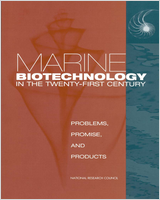NCBI Bookshelf. A service of the National Library of Medicine, National Institutes of Health.
National Research Council (US) Committee on Marine Biotechnology: Biomedical Applications of Marine Natural Products. Marine Biotechnology in the Twenty-First Century: Problems, Promise, and Products. Washington (DC): National Academies Press (US); 2002.

Marine Biotechnology in the Twenty-First Century: Problems, Promise, and Products.
Show detailsDramatic developments in understanding the fundamental underpinnings of life have provided exciting opportunities to make marine bioproducts an important part of the U.S. economy. Several marine based pharmaceuticals are under active commercial development, ecosystem health is high on the public's list of concerns, and aquaculture is providing an ever greater proportion of the seafood on our tables. Nevertheless, marine biotechnology has not yet caught the public's, or investors', attention. Two workshops, held in 1999 and 2001 at the National Academy of Sciences, were successful in highlighting new developments and opportunities in environmental and biomedical applications of marine biotechnology, and also in identifying factors that are impeding commercial exploitation of these products.
The following recommendations, based in large part on the workshop discussions, aim to identify the barriers restricting progress in the application of marine biotechnology to biomedicine and environmental science.
- The search for new drugs and agrichemical compounds should be revitalized by using innovative methods to gain a more fundamental understanding of the biosynthetic capabilities of marine organisms. Priority should be given to currently uncultured microorganisms including an increased effort in both culturing methods and culture-independent gene product analysis; exploration of unexamined habitats for new marine organisms; application of tools such as genome sequencing, functional genomics, and proteomics to new “model” species of marine origin; and application of molecular biology to the synthesis of novel marine bioproducts. Use of these technologies should also foster sustainability and provide alternatives to the continued harvest of marine organisms.
- New paradigms should be developed for detecting marine natural products and biomaterials as potential pharmaceuticals, biopolymers, and biocatalysts, and for understanding how they exert their biological properties. Updated high throughput methods will need to be developed, adapted, and used to ensure that the testing is done in a timely fashion. In order to maximize the potential for commercial application, new strategies, such as DNA microarrays, mechanism-based profiling screens, integrated pharmacology, and increasingly sophisticated chemical ecology studies are needed for rapidly determining the mechanisms of action of new marine bioproducts. Access to updated and expanded biomedical screening programs is needed in a variety of therapeutic areas, involving broadly coordinated groups of investigators and novel strategies for the rapid identification of chemicals of biomedical importance.
- Better tools should be developed for using marine biotechnology to help solve environmental problems such as biofouling, pollution, ecosystem degradation, and hazards to human health.
- Greater emphasis should be given to research efforts that seek to commercialize marine bioproducts and assays for medical and environmental applications. Bringing these advances to commercialization will require stronger partnerships between scientists, the public, and innovative small companies. Fostering such partnerships, facilitating technology transfer, and streamlining government regulatory requirements will be needed for marine biotechnology to achieve its full potential.
- Executive Summary - Marine Biotechnology in the Twenty-First CenturyExecutive Summary - Marine Biotechnology in the Twenty-First Century
- Biomedical Applications of Marine Natural Products: Overview of the 2001 Worksho...Biomedical Applications of Marine Natural Products: Overview of the 2001 Workshop - Marine Biotechnology in the Twenty-First Century
- Chromosome neighbors for GEO Profiles (Select 27106705) (16)GEO Profiles
- Taxonomy Links for Nucleotide (Select 1207734524) (1)Taxonomy
- Concise Conserved Domain Links for Protein (Select 1830494785) (1)Conserved Domains
Your browsing activity is empty.
Activity recording is turned off.
See more...